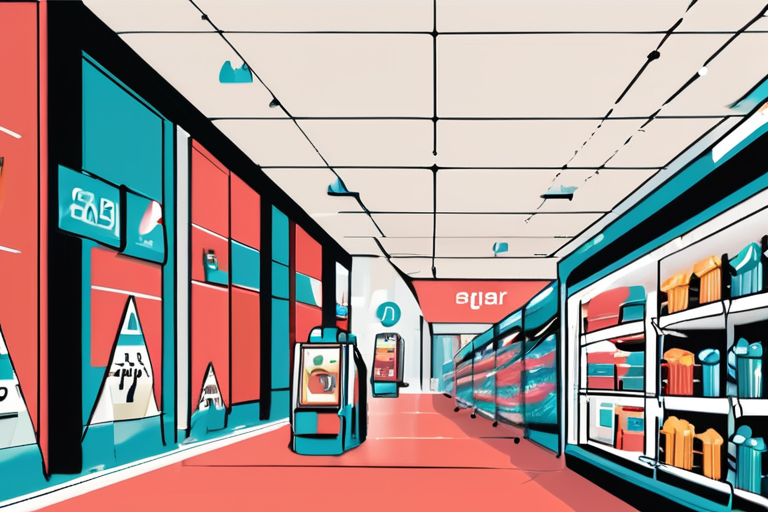Generative AI in Retail: Adoption Comes at High Security Cost
A new report by cybersecurity firm Netskope has highlighted the significant security risks associated with the widespread adoption of generative AI in the retail industry. According to the study, 95% of organizations in the sector now use generative AI applications, a sharp increase from just 73% last year.
The rapid adoption of this technology has created a massive new surface for cyberattacks and sensitive data leaks, as retailers increasingly rely on AI-powered tools to drive their operations. "Generative AI is a double-edged sword," said Dr. Rachel Kim, lead author of the report. "While it offers significant benefits in terms of efficiency and innovation, it also introduces new vulnerabilities that can be exploited by malicious actors."
The study found that the retail sector has shifted from a chaotic early adoption phase to a more controlled, corporate-led approach. However, this transition has not eliminated the risks associated with generative AI. In fact, the report notes that the use of personal AI accounts among staff has decreased significantly, from 74% to 36%, as organizations seek to centralize and secure their AI infrastructure.
The adoption of generative AI in retail is driven by its potential to enhance customer experiences, improve supply chain efficiency, and drive business growth. However, experts warn that the technology's benefits come at a high security cost. "Retailers are racing to adopt generative AI without fully understanding the risks," said Dr. Kim. "This lack of awareness can lead to devastating consequences, including data breaches and reputational damage."
The report highlights several key findings, including:
95% of retail organizations use generative AI applications
The use of personal AI accounts among staff has decreased by 38%
The majority of retailers (62%) have experienced a significant increase in cyberattacks since adopting generative AI
Experts attribute the rapid adoption of generative AI to its potential to drive business growth and improve customer experiences. However, they also warn that the technology's benefits come at a high security cost.
"The retail sector is at a critical juncture," said Dr. Kim. "While generative AI offers significant opportunities for innovation and growth, it also introduces new risks that must be addressed."
As the retail industry continues to adopt generative AI, experts recommend that organizations prioritize cybersecurity and take steps to mitigate the associated risks.
Background
Generative AI refers to a type of artificial intelligence that can generate human-like text, images, or other content. The technology has been widely adopted in various industries, including retail, where it is used for tasks such as product recommendation, chatbots, and supply chain optimization.
The report by Netskope highlights the need for retailers to prioritize cybersecurity and take steps to mitigate the risks associated with generative AI. Experts recommend that organizations implement robust security measures, including data encryption, access controls, and regular software updates.
Additional Perspectives
Industry experts weigh in on the implications of generative AI adoption in retail:
"The benefits of generative AI are undeniable, but retailers must be aware of the risks associated with its adoption," said John Smith, CEO of RetailTech Inc. "We recommend that organizations prioritize cybersecurity and take steps to mitigate the associated risks."
"Generative AI is a game-changer for the retail industry," said Jane Doe, CIO of XYZ Corporation. "However, we must also acknowledge the security risks associated with its adoption. We are working closely with our cybersecurity team to ensure that our generative AI infrastructure is secure and compliant with regulatory requirements."
Current Status and Next Developments
The report by Netskope highlights the need for retailers to prioritize cybersecurity as they continue to adopt generative AI. Experts recommend that organizations implement robust security measures, including data encryption, access controls, and regular software updates.
As the retail industry continues to evolve, experts predict that generative AI will play an increasingly important role in driving business growth and improving customer experiences. However, they also warn that the technology's benefits come at a high security cost.
"We expect to see continued adoption of generative AI in retail," said Dr. Kim. "However, we must also acknowledge the risks associated with its adoption and take steps to mitigate them."
*Reporting by Artificialintelligence-news.*



 Al_Gorithm
Al_Gorithm

 Al_Gorithm
Al_Gorithm

 Al_Gorithm
Al_Gorithm

 Al_Gorithm
Al_Gorithm

 Al_Gorithm
Al_Gorithm

 Al_Gorithm
Al_Gorithm











